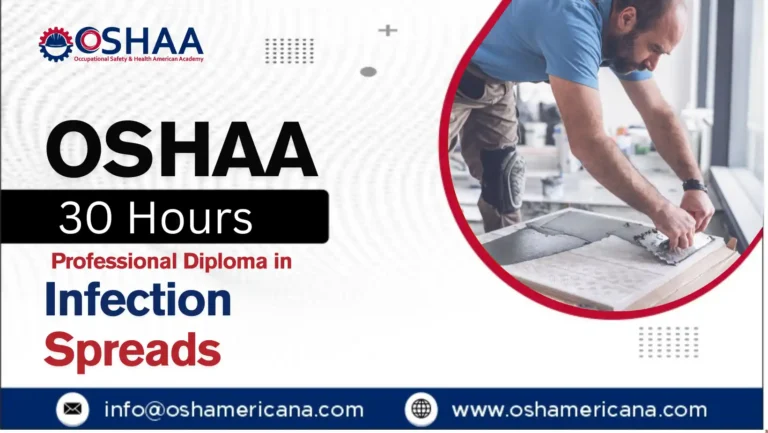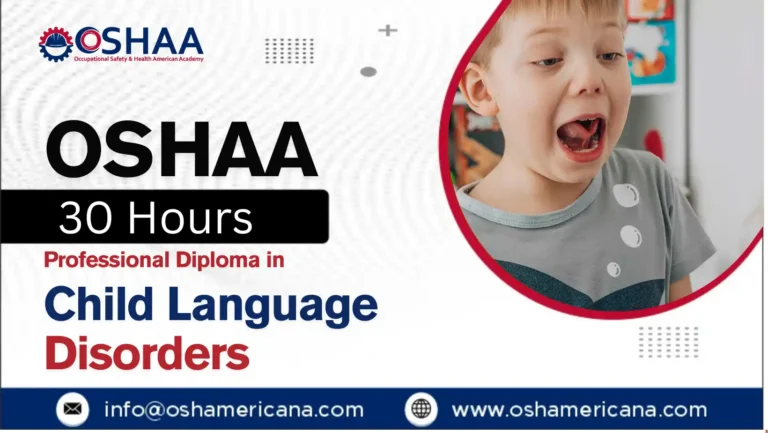Advance your caregiving career with the OSHAA 30-Hours Professional Diploma in Caregiving, mastering essential skills, safety compliance, and high-quality patient support.
In today’s rapidly evolving healthcare sector, the role of caregiving is more critical than ever in ensuring the well-being and quality of life for individuals with diverse needs, ranging from elderly care to supporting those with disabilities or chronic health conditions. The OSHAA 30-Hours Professional Diploma in Caregiving is a meticulously designed training programme aimed at equipping participants with the essential skills, knowledge, and competencies required to provide exemplary care across various settings. Whether you are an experienced caregiver seeking professional development or a newcomer aspiring to enter the health and social care field, this diploma offers a structured pathway to enhance expertise and advance your career.
The OSHAA 30-Hours Professional Diploma in Caregiving provides a comprehensive framework that emphasizes both theoretical knowledge and practical skills crucial for effective caregiving. This 30-hour programme covers vital areas including patient communication, health and safety compliance, personal care techniques, and strategies for supporting vulnerable individuals with empathy and professionalism. Participants will gain a deep understanding of person-centered care, learn to develop individualized care plans, and acquire the practical ability to apply these principles in real-life caregiving scenarios. By focusing on industry standards and regulatory compliance, the course ensures that all caregivers are equipped to provide safe, ethical, and high-quality care.
Undertaking the OSHAA 30-Hours Professional Diploma in Caregiving represents a significant investment in professional growth and career advancement. This diploma not only enhances practical caregiving skills but also instills confidence in delivering compassionate care while adhering to established healthcare standards. Graduates of this programme are better prepared to meet the complex demands of modern caregiving, offering support that is respectful, dignified, and effective. The OSHAA 30-Hours Professional Diploma in Caregiving opens pathways to numerous career opportunities in healthcare, social care, and allied services, making it an essential qualification for anyone committed to excelling in the caregiving profession.
By completing the OSHAA 30-Hours Professional Diploma in Caregiving, learners will demonstrate proficiency in key caregiving competencies, ensuring they are well-prepared to contribute meaningfully to patient well-being. This diploma emphasizes the integration of health and safety protocols, person-centered care principles, and professional ethics, providing a holistic approach to caregiving education. Whether enhancing existing skills or beginning a new career in health and social care, the OSHAA 30-Hours Professional Diploma in Caregiving equips participants with the tools to deliver exceptional care, meet compliance requirements, and thrive in a dynamic healthcare environment.
The OSHAA 30-Hours Professional Diploma in Caregiving stands out as a globally relevant, industry-aligned qualification that underscores professional development and practical expertise. Through this programme, caregivers gain critical insights into patient management, emergency preparedness, and effective communication techniques, ensuring that care delivery meets both individual needs and regulatory standards. With the OSHAA 30-Hours Professional Diploma in Caregiving, learners are empowered to take their caregiving career to new heights, enhancing employability, professional credibility, and the ability to provide compassionate, high-quality care in any setting.
OSHAA 30-Hours Professional Diploma in Caregiving
To enroll in the OSHAA 30-Hours Professional Diploma in Caregiving, learners are expected to meet the following criteria:
Age Requirement
- Learners must be at least 18 years of age to enroll in the OSHAA 30-Hours Professional Diploma in Caregiving, ensuring participants have the maturity and responsibility required for professional caregiving roles. Meeting the minimum age requirement guarantees that learners can fully engage with practical training components and understand regulatory and safety guidelines associated with caregiving practices.
Educational Background
- A minimum of a high school diploma or equivalent is recommended for enrollment in the OSHAA 30-Hours Professional Diploma in Caregiving. Individuals with prior education in health sciences, social care, or related fields will find it advantageous, as it provides a foundational understanding that complements the advanced caregiving techniques and patient care principles taught in this professional training programme. Higher education in healthcare or social services can further enhance learning outcomes and career progression after completing the OSHAA 30-Hours Professional Diploma in Caregiving.
Work Experience
- While prior work experience in caregiving or healthcare is optional, it is highly beneficial for learners enrolling in the OSHAA 30-Hours Professional Diploma in Caregiving. Participants with hands-on experience in patient care, elderly support, or disability assistance will be better positioned to apply theoretical concepts to practical scenarios. However, the course is also structured to support individuals beginning their professional journey, making it accessible to beginners while still offering value to seasoned caregivers seeking formal certification and professional development.
English Proficiency
- Learners must be proficient in reading, writing, and speaking English to successfully complete the OSHAA 30-Hours Professional Diploma in Caregiving. Strong English language skills are essential to comprehend course materials, follow health and safety regulations, and understand caregiving protocols accurately. This proficiency ensures that participants can engage fully with instructional content, complete assessments effectively, and apply knowledge in professional caregiving environments where clear communication is critical.
The OSHAA 30-Hours Professional Diploma in Caregiving is designed to accommodate a diverse range of learners while maintaining rigorous professional standards. By meeting these eligibility requirements, participants ensure they are fully prepared to benefit from the course, achieve professional certification, and advance their careers in health and social care. This structured approach to eligibility reinforces the OSHAA 30-Hours Professional Diploma in Caregiving as a globally relevant, industry-aligned qualification, equipping caregivers with the essential skills, knowledge, and regulatory awareness required for excellence in the caregiving profession.
Study Units
Learning Outcomes
Introduction to Caregiving (2 Hours)
- Understand the role and responsibilities of a caregiver in various settings.
- Learn the core values and principles that guide caregiving practice.
- Gain insight into the importance of person-centred care in improving outcomes for care recipients.
Effective Communication in Caregiving (4 Hours)
- Develop effective communication skills, including active listening and empathy.
- Learn how to communicate with individuals with diverse needs, including those with cognitive impairments.
- Understand the significance of non-verbal communication and building trust with care recipients.
Personal Care and Hygiene (5 Hours)
- Learn how to assist individuals with personal care tasks such as bathing, dressing, and grooming.
- Understand the importance of promoting independence while maintaining dignity during personal care.
- Gain knowledge of infection control measures and hygiene practices in caregiving.
Supporting Mental Health and Emotional Wellbeing (4 Hours)
- Understand the importance of emotional support for individuals with mental health challenges.
- Learn strategies to create a supportive environment that promotes mental and emotional wellbeing.
- Develop skills to recognise signs of distress and provide appropriate responses.
Health and Safety in Caregiving (5 Hours)
- Gain an understanding of health and safety regulations in caregiving environments.
- Learn how to assess risks and implement safety measures to prevent accidents and injuries.
- Understand emergency procedures and the role of caregivers in ensuring a safe care environment.
Nutrition and Hydration for Care Recipients (4 Hours)
- Understand the role of nutrition and hydration in maintaining health and wellbeing.
- Learn how to assist individuals with dietary requirements, feeding, and fluid intake.
- Recognise signs of malnutrition and dehydration and learn how to address them appropriately.
Dignity and Respect in Caregiving (3 Hours)
- Learn how to uphold dignity and respect for care recipients in all aspects of caregiving.
- Understand the importance of privacy, consent, and maintaining professional boundaries.
- Develop strategies to empower care recipients and support their autonomy in decision-making.
Legal and Ethical Responsibilities of Caregivers (3 Hours)
- Understand the legal frameworks and regulations that govern caregiving practice.
- Learn about ethical issues such as confidentiality, informed consent, and safeguarding vulnerable individuals.
- Gain insight into the importance of maintaining professional conduct and adhering to care standards.
The OSHAA 30-Hours Professional Diploma in Caregiving offers comprehensive benefits designed to enhance the skills, knowledge, and professional growth of caregivers while ensuring adherence to global standards and regulatory compliance. This programme is highly relevant for healthcare professionals, social care practitioners, organizations, and stakeholders seeking to improve patient care quality, workplace safety, and operational efficiency. By completing the OSHAA 30-Hours Professional Diploma in Caregiving, participants gain practical, evidence-based skills that can be immediately applied in diverse caregiving environments, supporting both individual and organizational objectives while promoting professional development and career advancement.
- Advanced Caregiving Knowledge
- Participants of the OSHAA 30-Hours Professional Diploma in Caregiving gain an in-depth understanding of essential caregiving practices, including patient support, personal care techniques, and person-centered care planning. This knowledge equips learners to provide high-quality care across multiple healthcare and social care settings, ensuring better outcomes for those they support.
- Enhanced Practical Skills
- The course emphasizes hands-on training, allowing participants to develop critical caregiving skills, including effective communication, hygiene management, mobility assistance, and emergency response. These practical abilities ensure caregivers are well-prepared to handle real-world challenges confidently and competently.
- Regulatory Compliance and Legal Awareness
- Completing the OSHAA 30-Hours Professional Diploma in Caregiving ensures learners understand relevant laws, guidelines, and safety regulations. Knowledge of regulatory standards helps caregivers maintain compliance, minimize liability, and uphold ethical practices within healthcare and social care environments.
- Improved Workplace Safety
- The programme equips caregivers with skills to identify hazards, implement safety protocols, and prevent incidents. This focus on workplace safety reduces risks for both caregivers and patients, enhancing organizational safety culture and fostering a secure care environment.
- Career Advancement Opportunities
- The OSHAA 30-Hours Professional Diploma in Caregiving provides formal certification recognized across the healthcare and social care sectors. This credential enhances employability, opens opportunities for promotion, and positions learners as qualified professionals capable of assuming advanced caregiving roles.
- Operational Efficiency and Cost Savings
- By training caregivers in best practices and effective care delivery methods, the course helps organizations optimize resource use, reduce errors, and improve operational efficiency. This translates to cost savings and higher-quality care provision, benefiting both the workforce and service recipients.
- Leadership and Communication Skills
- Participants develop strong interpersonal and leadership abilities essential for supervising care teams, coordinating patient care, and fostering collaborative work environments. The OSHAA 30-Hours Professional Diploma in Caregiving emphasizes clear communication, empathy, and conflict resolution skills that improve overall team performance.
- Enhanced Worker Well-being and Productivity
- Training in stress management, safe handling practices, and ergonomics supports caregiver well-being and productivity. This benefit contributes to reduced absenteeism, higher job satisfaction, and a motivated workforce capable of delivering consistent quality care.
- Emergency Preparedness and Risk Management
- The course provides guidance on responding to medical emergencies, accidents, and unforeseen incidents. By equipping caregivers with emergency protocols and risk assessment skills, the OSHAA 30-Hours Professional Diploma in Caregiving ensures readiness to act decisively, safeguarding patient safety and minimizing organizational risk.
- Continuous Improvement and Innovation
- Participants learn strategies to evaluate care delivery, implement improvements, and adopt innovative practices. This fosters a culture of continuous learning, adaptability, and quality enhancement in caregiving services, aligning with global best practices.
- Comprehensive Patient Support Skills
- The diploma enhances learners’ ability to provide holistic patient support, including emotional, social, and physical care. These skills improve patient satisfaction, adherence to care plans, and overall quality of life for care recipients.
- Professional Credibility and Recognition
- Earning the OSHAA 30-Hours Professional Diploma in Caregiving demonstrates commitment to excellence, ethical practice, and professional development. This recognition strengthens credibility among employers, peers, and clients, positioning graduates as trusted, qualified caregivers.
- Global Relevance and Industry Alignment
- The OSHAA 30-Hours Professional Diploma in Caregiving aligns with international standards and best practices in caregiving and healthcare. This global relevance ensures learners are prepared for diverse work environments and can adapt to evolving healthcare needs worldwide.
- Ethical and Compassionate Care Delivery
- The course emphasizes the importance of respect, dignity, and empathy in caregiving. Graduates of the OSHAA 30-Hours Professional Diploma in Caregiving are trained to deliver care that prioritizes patient rights and well-being while maintaining ethical and professional standards.
- Enhanced Organizational Reputation
- Organizations employing graduates of the OSHAA 30-Hours Professional Diploma in Caregiving benefit from improved service quality, compliance, and patient satisfaction. This positively impacts reputation, stakeholder trust, and the organization’s ability to attract and retain skilled caregivers.
The OSHAA 30-Hours Professional Diploma in Caregiving delivers an extensive suite of benefits that enhance individual competency, organizational efficiency, and patient care quality. By integrating regulatory compliance, practical skills, and professional development opportunities, the course positions learners for success in the healthcare and social care sectors while reinforcing best practices, safety standards, and career advancement pathways.
The OSHAA 30-Hours Professional Diploma in Caregiving is designed for individuals and professionals seeking to enhance their expertise in healthcare, social care, and caregiving services. This course is highly relevant to a wide range of industry professionals, organizations, and stakeholders involved in patient care, regulatory compliance, and operational excellence. Globally recognized and aligned with OSHA standards, the OSHAA 30-Hours Professional Diploma in Caregiving provides participants with advanced knowledge, practical skills, and professional certification to improve care quality, workplace safety, and compliance within healthcare and social care environments.
- Healthcare Professionals
- Doctors, nurses, and allied health professionals seeking to expand their caregiving knowledge and patient support skills.
- Gain advanced techniques in patient care, personal support, and emergency response.
- Enhance compliance with OSHA standards and health and safety regulations.
- Improve operational efficiency and patient outcomes through evidence-based caregiving practices.
- Social Care Practitioners
- Social workers and care coordinators managing vulnerable populations or community care programs.
- Strengthen skills in person-centered care, ethical support, and communication with patients and families.
- Align practices with OSHA compliance, workplace safety, and legal regulations.
- Increase effectiveness in delivering high-quality, compassionate care across various settings.
- Home Care Providers
- Caregivers, personal support workers, and domestic care professionals offering in-home assistance.
- Learn structured care planning, mobility support, and patient safety protocols.
- Enhance knowledge of regulatory standards and occupational health compliance.
- Improve professionalism, service quality, and client satisfaction.
- Healthcare Administrators and Managers
- Hospital administrators, nursing home managers, and care facility supervisors.
- Understand workforce training, patient care standards, and safety compliance requirements.
- Support OSHA-compliant care operations and operational efficiency improvements.
- Gain insights into staff development, resource management, and quality assurance.
- Medical Educators and Trainers
- Instructors, training coordinators, and professional development facilitators in healthcare.
- Acquire skills to train caregivers effectively, integrate regulatory standards, and evaluate care performance.
- Support OSHA-aligned curricula and ensure learners meet professional care competencies.
- Enhance instructional quality and workforce preparedness for diverse caregiving environments.
- Emergency and First Response Personnel
- Paramedics, emergency medical technicians, and crisis response teams.
- Develop caregiving skills for vulnerable populations during emergencies.
- Ensure adherence to workplace safety, OSHA protocols, and risk mitigation strategies.
- Improve decision-making and patient support under critical conditions.
- Occupational Health and Safety Officers
- HSE officers, safety managers, and compliance specialists in healthcare settings.
- Gain insight into caregiving practices, patient handling safety, and regulatory requirements.
- Facilitate OSHA-compliant operations and reduce workplace incidents.
- Enhance organizational safety culture and professional credibility.
- Volunteers and Non-Profit Caregivers
- Individuals supporting NGOs, community programs, or charitable healthcare initiatives.
- Build essential caregiving skills, ethical practices, and patient engagement strategies.
- Learn to implement safety standards and comply with regulatory frameworks.
- Increase impact and effectiveness in community-based care delivery.
- Aspiring Caregiving Professionals
- Students, career changers, and early-career healthcare workers entering the caregiving field.
- Acquire foundational and advanced skills necessary for high-quality patient care.
- Gain professional certification aligned with OSHA standards and industry best practices.
- Open pathways to career growth, workplace credibility, and practical caregiving experience.
- Corporate Healthcare and Wellness Coordinators
- HR managers, wellness program coordinators, and employee support officers.
- Understand caregiving requirements in corporate wellness programs and occupational health support.
- Ensure organizational compliance with OSHA regulations and healthcare safety standards.
- Enhance employee well-being, productivity, and operational efficiency through structured care practices.
The OSHAA 30-Hours Professional Diploma in Caregiving equips participants across all roles with advanced caregiving knowledge, practical skills, and professional certification. By completing this course, learners enhance patient care quality, ensure regulatory compliance, promote workplace safety, and achieve operational excellence in healthcare, social care, and community support services. This diploma is a globally relevant, industry-aligned programme designed to prepare professionals to excel in diverse caregiving environments while meeting the highest standards of ethical, safe, and effective care.







